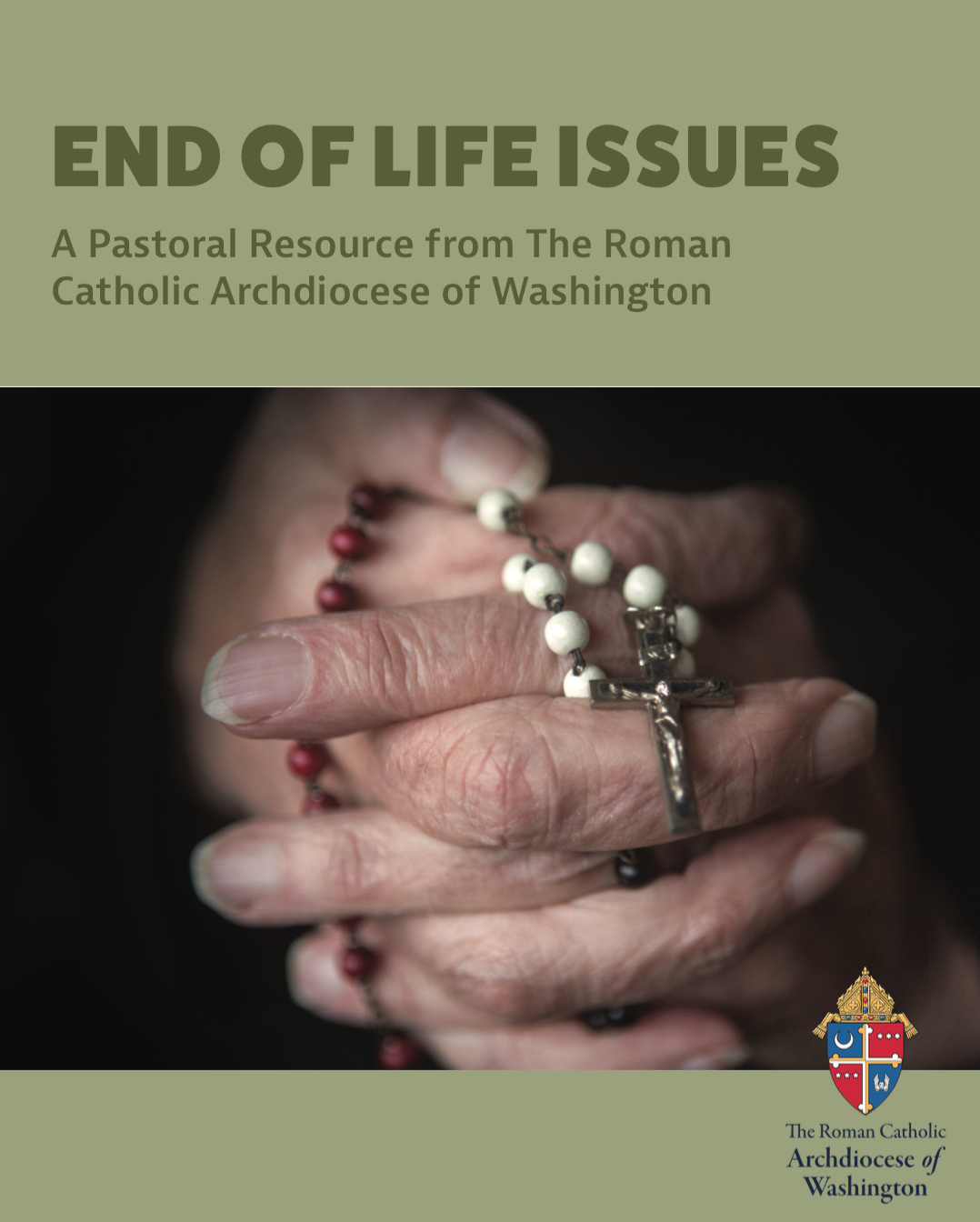End of Life Care
Lord God, you are attentive to the voice of our pleading.
Let us find in your Son comfort in our sadness,
certainty in our doubt, and courage to live through this hour.
Make our faith strong through Christ our Lord.
Amen.~ from the United States Conference of Catholic Bishops
Care for the sick at the end of life is a core teaching of the Catholic Church, and a corporal work of mercy. There are many resources available to help you navigate some of the different traditions and options for end-of-life-care, funeral planning, and the grieving process. Funerals have changed significantly in the past few decades, and we would like to share with you some of the Catholic teachings that guide our faith and spiritual practices. As you explore the many options for your loved one’s funeral, we encourage you to take some time to reflect on these teachings and to discern how best you can honor God and your loved ones in these preparations.
Please note that Catholic Cemeteries in the Archdiocese of Washington is here to support you as you move through this process for the first time. Please visit their website at ccaw.org for more resources. Your pastor and parish staff are also here to help guide you through this experience. We encourage you to reach out to your parish for more information on specialized grief groups, funeral services, and Mass intentions for your loved ones.
A Pastoral Resource on End of Life Issues
The Archdiocese of Washington has created a resource guide, available in both English and in Spanish, designed to help accompany you and your family as you begin to explore the many options for funeral and burials in our region. This guide also contains important information about end of life care and grief resources.
End-of-Life Care and Advance Care Planning
An advance care plan, also known as an advance directive or a living will, is a written statement detailing your desires for medical treatment and decision-making in circumstances in which you are no longer able to express informed consent. Advance care planning is not just for the sick and elderly members of our community. Rather, this planning can help each of us prepare for unexpected situations. Contrary to certain stereotypes, advance care planning is not about “restricting” your options for end-of-life care. Rather, an advance care plan allows you to talk about what kind of care you do want.
The Maryland Catholic Conference has published a booklet entitled Comfort and Consolation. This document provides information on hospice and palliative care, advance care planning, and other relevant topics as you and your family begin to prepare an advance care plan.
8 Principles of Catholic Teaching on End of Life Care (from the Maryland Catholic Conference)
- We do not have the right to take our own lives nor to directly bring about the death of any innocent person.
- Each of us is obliged to care for the gift of life and health that God has given us.
- No patient is obliged to accept or demand useless or excessively burdensome medical interventions.
- The human person always has dignity, even in suffering
- Even when we cannot cure, we can always care.
- There is a presumption of providing food and fluid unless it is futile or death is imminent.
- Patients in end-stage conditions or a persistent vegetative state possess dignity and deserve good care.
- Preparation for death can be a beautiful time to reconcile with family, friends and God.
Recorded Webinars and Presentations
In October 2020, the Office of Life Issues and Office of Deaf and Disabilities Ministry collaborated with Voice Your Choice, Montgomery County for a webinar on Advance Care Planning. Voice Your Choice offers an excellent online resource for advance care planning, which we encourage you to consider as you discern your own advance care planning. The webinar can be accessed on Youtube.
The Office of Life Issues hosted a webinar on Hospice and Palliative Care on November 18, 2020. The webinar was hosted in collaboration with Trinity Health and Holy Cross Hospital. A panel of experts in social work, nursing, and Catholic moral teaching addressed some of the challenges that Catholics face in selecting their end-of-life care. A link to the recorded webinar can be found here.
Planning After Death
“At the death of a Christian, whose life of faith was begun in the waters of Baptism and strengthened at the Eucharistic table, the Church intercedes on behalf of the deceased because of its confident belief that death is not the end, nor does it break the bonds forged in life. The Church also ministers to the sorrowing and consoles them in the funeral rites with the comforting Word of God and the Sacrament of the Eucharist.” (Order of Christian Funerals, no. 4)
The Catholic funeral rite is divided into several events and rituals that help to guide our mourning process. Each of these stations serves a particular purpose in honoring the dead and serving the living. Most Catholic funerals use all three of these rituals. For more information, please see visit this online resource from the U.S. Conference of Catholic Bishops.
For more information on the Mass of Christian Burial, please see the Archdiocese of Washington’s informational brochures, available in English and Spanish.
A Note from the Catholic Cemeteries of the Archdiocese of Washington
Jesus Christ, who has accompanied you and your loved one in life, will walk with you in your path of sorrow. The Church, too, desires to accompany you in this time of loss. Bereavement support groups provide an excellent opportunity for mourners to share their feelings and experiences in a caring, non-judgmental, confidential setting. Check with your parish about bereavement support groups or visit Catholic Cemeteries of the Archdiocese of Washington’s website for resources.
For more information, resources, and information on upcoming events, please contact the Office of Life Issues.

